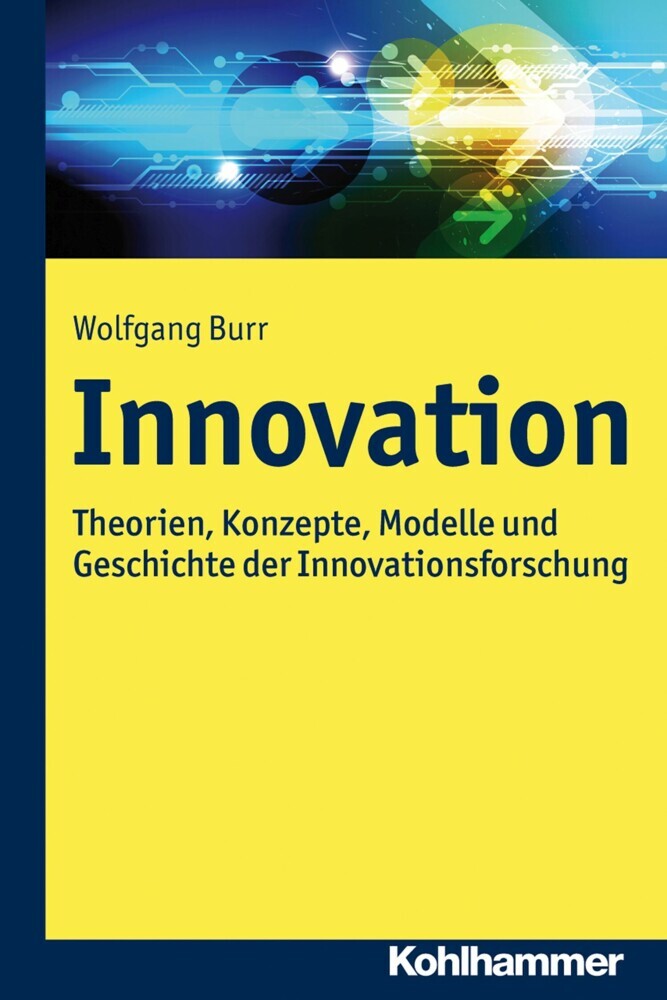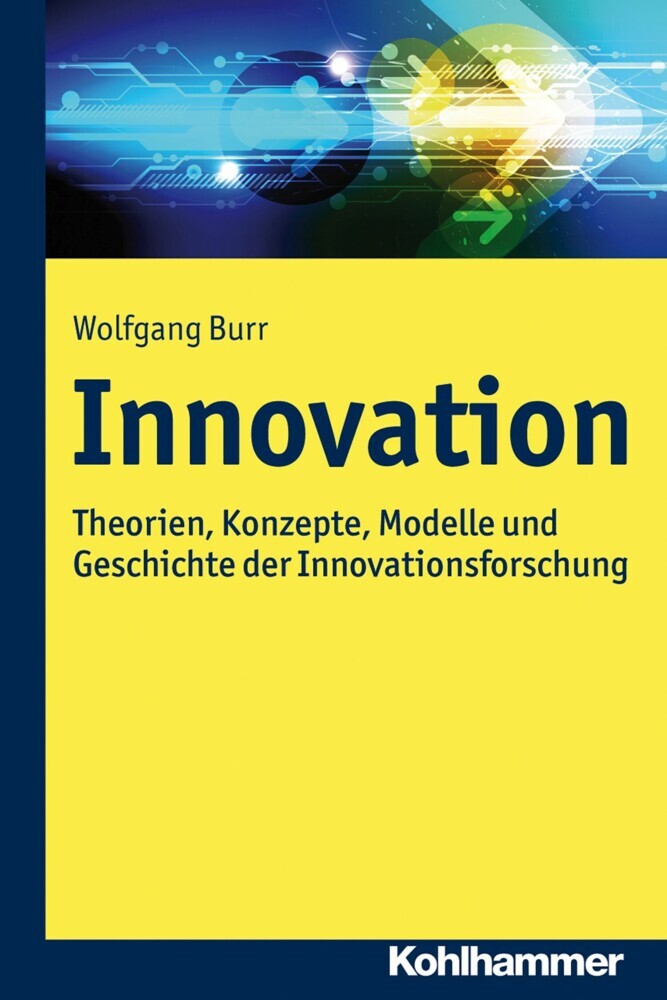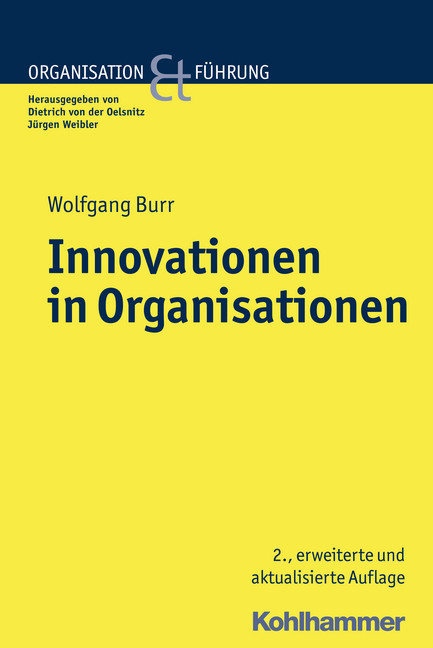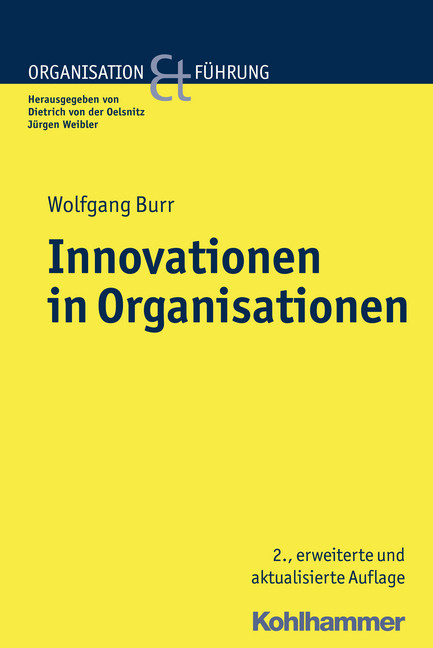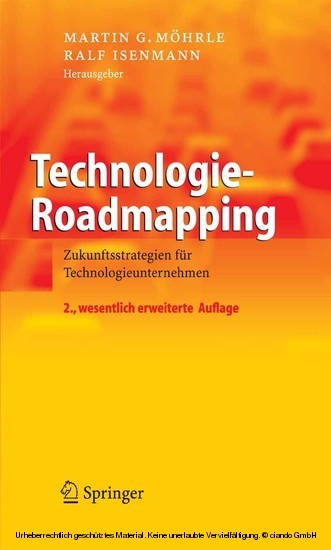Innovation
Theorien, Konzepte und Methoden der Innovationsforschung
Innovations are one of the central determinants of the economic development and growth of business. Innovation management is therefore one of the central tasks of leadership. Innovation research has recently been characterised from an empirically quantitative point of view. This work, however, emphasises the theoretical conceptualised perspective, which is essential as a basis for empirically quantitative studies. This is why central business and economic theories, concepts and methods of innovation research are being explored. Furthermore, it contains an introduction into the historical development and the central publications of business economic innovation research, which has always had interdisciplinary links.
The publisher Prof. Dr. Wolfgang Burr holds a professorship in innovation and service management at the University of Stuttgart. The authors of the contributions are experts in their respective fields.
The publisher Prof. Dr. Wolfgang Burr holds a professorship in innovation and service management at the University of Stuttgart. The authors of the contributions are experts in their respective fields.
1;Deckblatt;12;Titelseite;43;Impressum;54;Vorwort;65;Inhalt;86;Geschichte der Innovationsforschung;106.1;Die frühen Phasen der deutschsprachigen betriebswirtschaftlichen Innovationsforschung (bis 1980);126.1.1;1 Vorläufer der betriebswirtschaftlichen Innovationsforschung;146.1.1.1;1.1 Volkswirtschaftliche Innovationsforschung: Schumpeter und seine Vorläufer;146.1.1.2;1.2 Firmenfestschriften, Unternehmerbiographien und Literatur zu Erfindungen;156.1.1.3;1.3 Die technisch orientierte Betriebswirtschaftslehre (Nicklisch, Dietrich, Gutenberg);166.1.2;2 Die ersten Arbeiten zur betriebswirtschaftlichen FuE-und Innovationsforschung;176.1.2.1;2.1 Frühe Einzelbeiträge;176.1.2.2;2.2 Die ersten umfassenden Gesamtdarstellungen;186.1.3;3 Die erste Blütezeit der betriebswirtschaftlichen Innovationsforschung (1965-1980);206.1.3.1;3.1 Thematische Schwerpunkte und fachliche Herkunft der frühen Innovationsforschung;206.1.3.2;3.2 Fünf Grundausrichtungen der frühen betriebswirtschaftlichen Innovationsforschung nach der Zielsetzung/Forschungsmethode und der Adressatengruppe;306.1.3.2.1;3.2.1 Arbeiten mit Fokus auf Begriffsarbeit und Klassifikation und beschreibende Darstellungen;306.1.3.2.2;3.2.2 Primär theoretisch-konzeptionelle Arbeiten;306.1.3.2.3;3.2.3 Primär empirische Arbeiten (qualitative oder quantitative Methodik);306.1.3.2.4;3.2.4 Arbeiten mit Fokus auf Methodenentwicklung und Methodenanwendung in der Praxis;316.1.3.2.5;3.2.5 Praktikerliteratur und Lehrbücher zum FuE- und Innovationsmanagement;326.1.4;4 Interdisziplinäre Arbeiten zur Innovationsforschung, die im Grenzgebiet von VWL und BWL anzusiedeln sind (v. a. Arbeiten mit einem Industrial Organization-Hintergrund);326.1.5;5 Innovationsliteratur aus der/zur DDR;356.1.6;6 Weitere Entwicklung der betriebswirtschaftlichen Innovationsforschung nach 1980;366.1.7;Literaturverzeichnis;376.2;Zur Entwicklung der englischsprachigen betriebswirtschaftlichen und volkswirtschaftlichen Innovationsforschung;416.2.1;1 Frühe Phasen der Innovationsforschung;426.2.2;2 Politik als Treiber des Diskurses über Innovation;446.2.3;3 Herausbildung der volkswirtschaftlichen Innovationsforschung;456.2.4;4 Betriebswirtschaftliche Innovationsforschung in den USA;486.2.5;5 Die Entwicklung der Innovationsforschung in Großbritannien;506.2.6;6 Die Verbreitung der Innovationsforschung in anderen europäischen Staaten;536.2.7;7 Implikationen für die Innovationsforschung im deutschsprachigen Raum;566.2.8;Literaturverzeichnis;587;Theorien der Innovationsforschung;627.1;Interaktive Innovationstheorien als alternative »Schule« der Innovationsforschung;647.1.1;1 Veränderte Rahmenbedingungen für Innovation;657.1.1.1;1.1 Dynamisierung;657.1.1.2;1.2 Gestiegene Komplexität;667.1.1.3;1.3 Erhöhte Arbeitsteiligkeit;667.1.1.4;1.4 Selbstorganisierende Netzwerke als dominanter Innovator;677.1.2;2 Schulen der Innovationstheorie;677.1.2.1;2.1 Voluntaristische Modelle;687.1.2.2;2.2 Kontextualistische Modelle;697.1.2.3;2.3 Interaktive Modelle;717.1.3;3 Interaktionsökonomik als Basistheorie;747.1.3.1;3.1 Interaktionsökonomik: Merkmale und Theoriequellen;747.1.3.2;3.2 Die Rolle sozialer Interaktion im ökonomischen Kontext;757.1.3.3;3.3 Schlüsselakteurskonzept;777.1.4;4 Drei zentrale Perspektiven interaktiver Innovationstheorien;787.1.4.1;4.1 Systemische Perspektive: Innovationssysteme;787.1.4.2;4.2 Prozessuale Perspektive: Innovationsprozesse;807.1.4.2.1;4.2.1 »The Innovation Journey«: Ein dynamisches Prozessmodell;817.1.4.2.2;4.2.2 »Open Innovation«: Die Öffnung des Innovationsprozesses;817.1.4.2.3;4.2.3 Innovationspfad: Ein evolutorisches Konzept der Pfadkreation;827.1.4.3;4.3 Interaktive Perspektive: Akteure und ihre Interaktion;867.1.5;5 Fazit: Neue Herausforderungen, neue Erklärungsansätze;887.1.6;Literaturverzeichnis;897.2;Organisation und Innovation;937.2.1;1 Einleitung;937.2.2;2 Fundamentale Innovationen und die Entstehung neuer Organisationsformen und neuer Populationen v
Burr, Wolfgang
| ISBN | 9783170250154 |
|---|---|
| Artikelnummer | 9783170250154 |
| Medientyp | E-Book - PDF |
| Copyrightjahr | 2014 |
| Verlag | Kohlhammer Verlag |
| Umfang | 446 Seiten |
| Sprache | Deutsch |
| Kopierschutz | Digitales Wasserzeichen |

